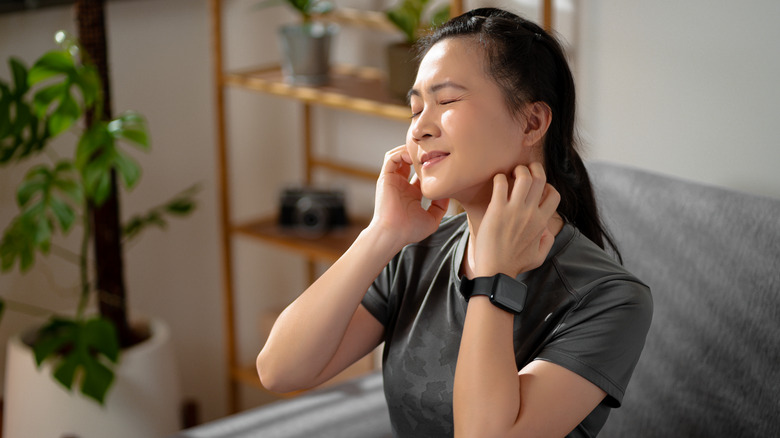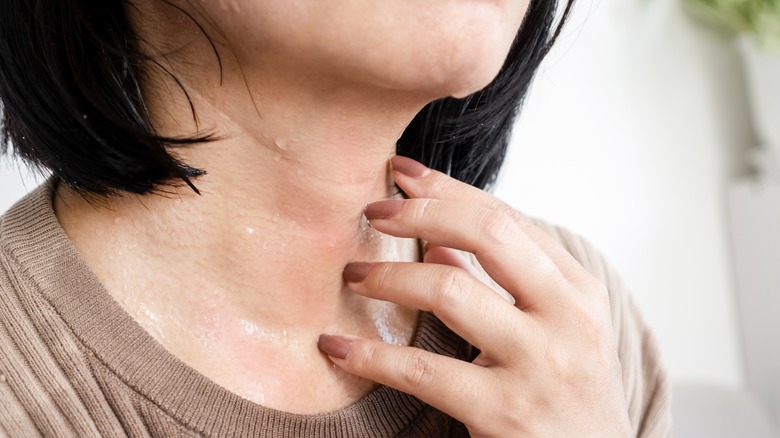Can You Be Allergic To Your Own Sweat?
When you're starting to kick up a sweat, you may notice little hives beginning to appear on your arms and neck — ones that get worse before slowly disappearing after about 30 minutes to an hour. Or you may notice them popping up when you're in the sun at the park or at the beach. If these kinds of hives are a regular occurrence, you may be starting to wonder if you're allergic to your sweat.
According to the American Academy of Allergy, Asthma & Immunology, an allergic reaction is the body's response to what it considers a foreign invader. Sometimes, your immune system overacts to specific materials, leading to your body producing antibodies to fight the invader. While the invader could be something like pollen or bee venom, it can also be the contents of your sweat. It might clear up after the sweat is removed — but it can also lead to a severe allergic reaction.
You can find out if your hives are due to sweat by looking at what a sweat allergy is, common triggers, and ways to manage it. Keep yourself informed so a sweat allergy doesn't take over your life.
What is a sweat allergy?
It might seem strange that your body can become allergic to its own by-product, but it can happen in those with a sweat allergy. The contents of a person's sweat can lead to a release of antibodies, according to the Japanese Society of Allergology. The development of a sweat allergy is often related to cholinergic urticaria.
Individuals with this condition commonly develop hives as the body temperature rises, activating the sweat glands. They can develop red bumps in a circular pattern, stated WebMD. These are typically located on the hands and feet, but you might also get them on your chest. Some individuals get hives all over their bodies. WebMD notes that the hives typically clear up within a few hours of the sweat trigger without any intervention. Sometimes swelling, especially in the face and lips, can happen during an allergic reaction to sweat.
Some people have been known to experience other symptoms like salivation, headache, and rapid heartbeat from sweating. Anaphylaxis (low blood pressure, constricting of the throat, and bronchospasms) can also happen when cholinergic urticaria is associated with exercise. This requires immediate medical attention to alleviate the symptoms. It's essential to know when you have an allergic reaction so you can take action to treat it quickly.
Triggers of a sweat allergy
Sweating isn't something that's easy to control, since your body does it automatically when your core temperature rises. But certain risk factors have been known to trigger an allergic reaction. Some triggers might seem obvious. For example, exercise, hot baths, and warm rooms generally lead to more sweating and hives (via Medical News Today).
There are also other triggers you might not even consider. Your friend and you getting into a fight could lead to feelings of anger, frustration, stress, and nervousness — which can cause sweating. Think about those clammy hands when you're stressed about a test, or how the sweat might bead on your forehead when getting reprimanded by your boss.
It could also be something you're eating that leads to your hives. Spicy foods might taste amazing, but the resulting sweat can cause your condition to flare up. Drinking alcohol is another potential trigger, since it tends to make you feel warmer and cause your face to flush. Knowing some of the common and well-known triggers of the condition can help you find ways to manage and prevent a flare-up.
How to manage an allergic reaction to sweat
A sweat allergy can affect your life in many ways, but thankfully, reactions to sweat are typically mild and can be handled with antihistamine medications, immunosuppressants, and lifestyle changes. Just because you have an allergy to sweat doesn't mean you have to stop getting exercise. It just means that you need to take precautions. In addition to medication from your healthcare specialist, do low-impact exercise that limits your sweating. Ensure your climate is well controlled within your home to ensure sweating is at a minimum, especially in hot climate areas. When outdoors, choose clothing and spaces designed to keep you cool.
For stress, try stress management techniques to help improve your reaction to stressful situations and keep your body calm. Research from Dermatologic Therapy also shows that those with the condition might also try participating in regular sweating activities to lessen the amount of histamine released by the body. Modifying your diet to limit spicy foods and alcohol has also been shown to be helpful in managing symptoms. And when you can't avoid sweating, rapid cooling could also be beneficial in avoiding symptoms.
A sweat allergy can lead to a range of symptoms, like hives. Knowing what the triggers might be can make management easier. And make sure to know the signs of when an allergic reaction really becomes serious – just in case.




